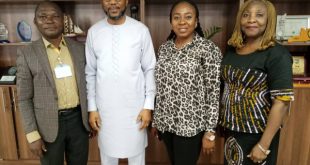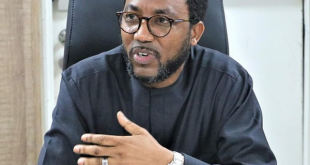
By the Association of Igbo Maritime Practitioners In Nigeria -ASIMPIN.
You recall that the Association of Igbo Maritime Practitioners in Nigeria – ASIMPIN, formally known as Igbo Maritime Forum, before its registration with the Corporate Affair Commission – CAC, is driven by our Vision Statement, which is, “Promoting Global Peace through Commerce” and our Mission Statement, which is, “Protecting Global Commerce through firm Advocacy, Dialogues and Collaborations”.

Against this background, the onus of prompt monitoring of administrative and operational obligations of all stakeholders within the maritime sector to ensure the smooth flow of international trades, fair trade treatments in all facets and the promotion of a healthy competitive and business friendly maritime environment, becomes our collective pursuits as a group.
Also, as a group, this is in line with other related interest, as enshrined in our amended constitution.

Our take on the assessment / performances of the maritime sector in outgone year 2016, will be retrospectively considered as follows:

In no particular order, permit us to state as follows:
*The year 2016 cannot go down in the anal of the maritime history without re-echoing of the word “Recession”. In all facets of the maritime operations, recession indeed towed its negative impacts and brought to the fore some industrial challenges.
* On one hand, it affected cargo traffic volumes, ports/terminal total capacities utilization, outputs, turn overs, professional incapacitation, increased revenue generation via exploitative taxations, scarcity of fund, leading to low state of investment in most facet of operations, inadequate or non- prompt regulatory functions attainments, and attendance to operational concerns, etc.
* On the other hand, ‘recession’ presented some salient challenges . The challenges presented by recession became the needed experience or a required tunic to open up a new horizon of opportunities.
* Notably, the challenges exposed the true states of professional inadequacies and inefficiencies and indeed brought to the fore, the operational incapacities and existing realities in different services within the sub-sector of the maritime industry.
* In addition, the reckless spending by ports users was reduced drastically, reordering of priorities amongst regulatory agencies was obvious, other port users now carefully plan their spendings both at home and office environments.
THE IMPACT OF THE RECESSION ON THE MARITIME SECTOR AND SUGGESTIONS:
* The ‘recession’ impact was further compounded by the deliberate, harsh foreign trade policies of the Federal Government:
The Foreign exchange rate policy and the 41 items uploaded as unqualified for accessing FX through the bank fueled forex difficulties, financial scarcity and crisis.
Therefore, the impact of the ‘recession’ can be viewed and appreciated on sectorial bases, as follows:
- Maritime Domain:
* General low inwards and outwards traffic – Ships call to port was generally low. Even our export main stay recorded low patronages.
Recall that over two hundred different shipping lines/carriers left the Nigerian waters to China/Europe.
Many private vessels were noticeably off dock, some are seen lying idle within our territorial waters – economic free zones of 200 nautical miles.
Foreign fishing vessels were seen, dominantly discharging sea foods at our fishing terminals for foreign exchange. Meaning that our national trawlers are not operating at an optimal capacity or favorably competing evenly in our territorial waters, or meeting the desired demands, hence, it is obvious that they are well out-numbered by foreign trawling vessels on the international water. This was even as demand for sea foods continuously increased.
No Ship, cargo /terminal congestion was witnessed, due to low throughputs (i.e. low inwards and outwards traffic ).
Our territorial waterfronts recorded less piracy threats/activities, except for the internal militancy challenges.
Incidences of distress calls on our international waters was less, no much incidences of distress calls reported, in that regards.
Vessel dwell time at our anchorage /berths duration of 7-4 days is appreciably.
ISPS Code compliances is gathering momentum. Sanctions were tacitly escaped by the apex regulatory agencies. However, we witnessed the concerned agencies waking up from their slumber.
Apart from the Customs, most of the other regulatory agencies of the government recorded low or failed to meet their yearly revenue targets.
As a yearly traditions, different stakeholders meetings, breakfast meetings, workshops, conferences, seminars, capacity building/training programs, etc were observed, this is commendable.
Therefore, the maritime sector on a general submission, in terms of performance and rating cannot be scored above its 2015 performance indicators/ratings.
B). PORT SUB-SECTOR:
As the nation was plunged into economic recession, 2016, the port being a critical sector was not left out the “impacts of recession”.
Our ports did not record any meaningful improvement with regards to attaining a business friendly ports environment, owing to:
Increased human contact to cargo, epileptic e-commerce applications, uncoordinated automation processes, uncompetitiveness, highhandedness , arbitrariness etc is still the order of the day.
The World Bank Reports on the ease of doing business within the West African region speaks volume.
On the economic regulatory functions of the NSC and the absent of a regulatory framework:
The Court Litigation between the Nigeria Shippers Council and the Seaports Terminal Operators Association of Nigeria -STOAN, persisted. Except for the third party mediation and moves for parties to opt for Arbitration/ADR, this approach has not been concretized.
The trading public and indeed port users are of great expectation, following the quicker enactment process of the National Transport Commission(NTC) bill by the Parliamentarians.
Cargo dwell time at the terminal varies from 7days, 14 days, 21 days and above.
Apapa Ports Access roads still in a terrible state.
Vehicular Traffic ( The Apapa traffic gridlock) was not phenomenal due to low import traffic.
Berth Productivity – No Standard measuring yardstick.
Low cargo throughput and Forex policy indeed affected the investment targets of the terminal operators.
While the NPA insisted that the terminal operators should pay their outstanding royalties and other dues/fees in foreign currencies, the terminal operator insisted that forex policy is not to their best business interest, with respect to the provisions of their concession agreement, as such craved to pay loyalties in Naira.
The menace of rickety trucks plying our ports was reduced. Recorded number of damaged goods in transit was less compared to 2015.
On Greenfield (Virgin) Port Expansion and Developments:
Multiple Deep Seaports Development: In 2016, we witnessed deliberate efforts to conclude concession M.O.U . On Badagry Deep Sea Ports. The Onukola Deep Sea Ports( Ogun State), Igbaka Deep Sea Ports of Akwa Ibom State, issued promissory of project refinancing. The Lekki Deep Sea Ports received further investment advancement and a general endorsement of private investors and the government.
Again, there is need to go back to the drawing table. Deep Sea Ports development if driven with same concept of general port operational approach, may not propel real economic development as conceived.
ASIMPIN hereby join other stakeholders to clamor that the approved Deep Sea Ports should be tailored towards attaining specialities (Specialized Deep Seaports Operations). This will add impetus to the actualization of the intended objectives and create room for firm competitiveness within the sub-region.
Improving the Ship (Dock)Yards and Ship Bunkering Facility:
In 2016, this aspect of Shipping essential services did not measure up operationally and economically. There is need for a deliberate milestone improvement plan to be fast-tracked and integrated in this important sub sector of the maritime services/operations.
Presently, most vessels come to discharge its laden content at our ports and preferably go to Tema Ports for its bunkering services.
Channels and River Ports Dredging Activities:- In 2016, it did not record any meaningful or significant outputs in this regards.
 MMS PLUS NG – Maritime, Aviation, Business, Oil and Gas News Online Newspaper with coverage in Maritime, Oil and Gas, Aviation, Power and Energy as well as Financial News
MMS PLUS NG – Maritime, Aviation, Business, Oil and Gas News Online Newspaper with coverage in Maritime, Oil and Gas, Aviation, Power and Energy as well as Financial News









